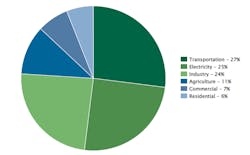Major U.S. cities leading in transit electrification
Evolving electric transit market
States and cities are adopting transit electrification at different rates, as evidenced by the patchwork of regulations, tax incentives and infrastructure project plans. For example, California has embarked on a plan to create a zero-emission vehicle (ZEV) model by 2035, with several other states, including New York, Massachusetts and Washington, following close behind.
The Infrastructure Investment and Jobs Act (IIJA) directs up to $30.7 billion to electric vehicles (EVs) and charging infrastructure. The funding consists of: $7.7 billion to build a nationwide EV charging network; $12.7 billion for deploying all types of green vehicles and fueling infrastructure, including EV and charging infrastructure; and $10.3 billion for smart grid and battery technology projects that deliver flexibility and resilience.
The Surface Transportation Reauthorization Act of 2021 authorized the Surface Transportation Block Grant Program, which provides $72 billion in funding to states and transit agencies for EV charging infrastructure and vehicle-to-grid infrastructure projects. Other notable programs include the Reducing Truck Emissions at Ports program, which will receive $250 million for truck electrification.
Representative transit electrification projects
One way to identify transit electrification projects is by looking at capital improvement plans or programs (CIPs) and statewide transportation improvement programs (STIPs). CIPs are published by government agencies that use public money to construct and maintain projects such as highways and bridges, sewer and water lines and transit infrastructure. Generally, municipal and county governments, regional organizations such as transit agencies and port authorities, and state departments and governments are responsible for issuing CIPs. The time spans covered by CIPs varies, but most detail projects that their issuers are planning over the next three to seven years. STIPs are similar to CIPs but they are issued by state departments of transportation and cover at least four years. They also include information from CIPs and similar documents issued by regional authorities and local governments within the states.
Among major cities, New York City has appropriated more than $150 million in the 2022-2025 fiscal year planning period. Washington, D.C. ($125.54 million), Madison, Wis. ($66.06 million), Seattle, Wash. ($46.92 million), and Honolulu, Hawaii ($26.39 million) also have substantial amounts earmarked.
New York City plans to spend $150.84 million to install EV charging infrastructure on streets and off-street parking facilities.
Washington, D.C, has three projects related to rail, bus and transit systems. The first is a circular bus depot program to house its entire fleet and include space for future growth in the size of the fleet along with battery-electric bus charging capabilities that costs $69.2 million. The second is a $55.84 million project that includes the construction of street storage and charging stations. The third, and by far the smallest, is the installation of 50 charging stations for $500.000.
----------------
David Cox is the president and founder of FirmoGraphs, a business focused on applying Business Intelligence to North American public infrastructure and utilities.
David Cox, PE | President, FirmoGraphs
Dave Cox is the president and founder of FirmoGraphs, a business focused on applying Business Intelligence (BI) to North American public infrastructure and utilities. He earned a BS in Civil Engineering from the University of California at Berkeley, and an MS from the University of Texas at Austin in environmental engineering. He is a California Professional Civil Engineer. Dave has spent his 30-year career doing engineering, marketing, and sales work with asset-intensive organizations in the energy, water, oil, and technology industries. He is passionate about using data to help North American industry make better decisions to improve both financial performance and the environment.






